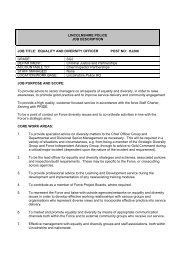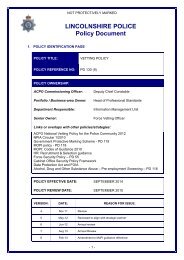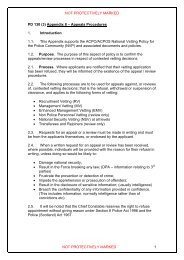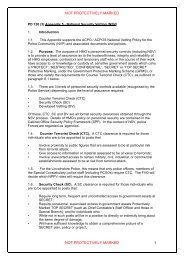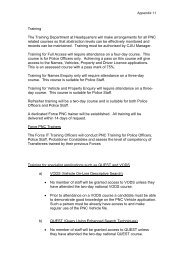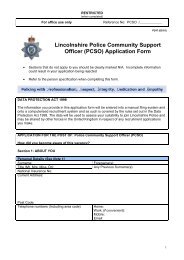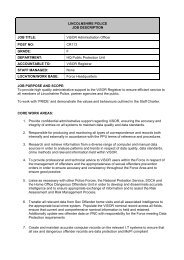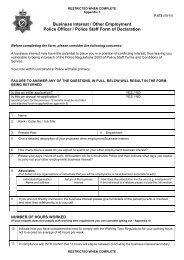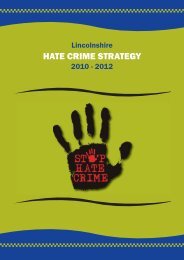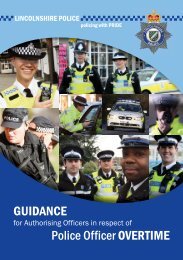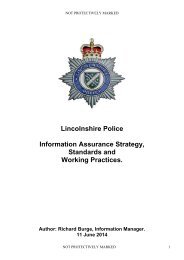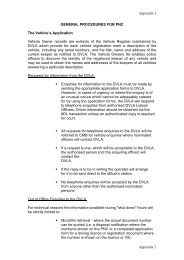THE LITTLE BOOK OF BIG SCAMS
THE LITTLE BOOK OF BIG SCAMS
THE LITTLE BOOK OF BIG SCAMS
You also want an ePaper? Increase the reach of your titles
YUMPU automatically turns print PDFs into web optimized ePapers that Google loves.
Contents1 Introduction3 Myth Busters4 10 Golden Rules5 Identity Fraud8 Mass Market Fraud – Scam Mail10 Investment Scams12 Door-to-Door Scams14 Dating and Romance Scams16 Banking and Payment CardScams18 Mobile Phone Scams20 Health and Medical Scams22 Internet Scams24 Psychic and Clairvoyant Scams26 Frequent Scamming Tools29 Fraud is Not a Victimless Crime32 Handy Hints to Protect Yourself36 What to do if You Get ScammedContacts and Reporting AdviceBE SUSPICIOUS
<strong>BIG</strong><strong>SCAMS</strong>IntroductionEvery year, the British public loses billions of pounds to scammers whobombard us with online, mail, door-to-door and telephone scams.Scams (or frauds) are often difficult toinvestigate; they can be complicatedand often involve many people (bothvictims and suspects). They can take alot of resources to investigate and courtscan find it difficult to convict suspectsbecause of the grey area that existsbetween dishonesty and sharp practice.Prevention through awareness is thereforea vital strand in combating scammers.The Metropolitan Police Service’sOperation Sterling Team is pleased tobring you the Little Book of <strong>BIG</strong> Scams.We were inspired by The Little BlackBook of Scams, originally created by theAustralian Competition and ConsumerCommission as inspiration. We hope thisbooklet will increase your awareness ofthe vast array of scams that are beingused and teach you some easy steps youcan take to protect yourself. It should beseen as a general guide to many of thescams currently operating in the UK.Scams do not discriminateScams target people of all backgrounds,ages and income levels. Fake lotteries,investment frauds and romance scamsare some of the favoured means ofseparating the unwary from their money.New varieties of these scams appear allthe time.Operation Sterling has seen thedevastating effects scams can have onpeople and their families. One of the bestways to fight scammers is to help youtake steps to prevent yourself from beingcaught out in the first place.Some adults may be especially vulnerableto financial abuse. Consider liaising withyour local Social Services safeguardingadults department if you are concernedabout someone you know who may bevulnerable (when contacting your localSocial Services, ask for adult social care).Partner agencies can work together tokeep an adult at risk safe.<strong>THE</strong> <strong>LITTLE</strong> <strong>BOOK</strong> <strong>OF</strong> <strong>BIG</strong> <strong>SCAMS</strong>1
IntroductionProtect YourselfIf you want to stay on top of scams,visit our Fraud Alert websitewww.met.police.uk/fraudalertwhich contains current information ondifferent scams targeting consumers.It also provides you with tips on guardingyourself against scams, new scam stories,scam alerts and advice on reporting scams.JUST REMEMBER:IF IT SOUNDS TOOGOOD TO BE TRUE,IT PROBABLY IS.2 <strong>THE</strong> <strong>LITTLE</strong> <strong>BOOK</strong> <strong>OF</strong> <strong>BIG</strong> <strong>SCAMS</strong>
<strong>BIG</strong><strong>SCAMS</strong>Myth bustersBeing aware of these common myths will minimise your chances ofbeing scammed.All companies, businesses andorganisations are legitimate becausethey are approved and monitored by thegovernment.There are short cuts to wealth that only afew people know.THIS IS NOT ALWAYS TRUETHIS IS NOT ALWAYS TRUEWhilst there are rules about setting upand running a business or a companyin the UK, scammers can easily pretendto have approval when they don’t.Businesses that do have approval tooperate could still try and scam youby acting dishonestly. Just because abusiness looks legitimate does not meanthat it is.All internet websites are legitimate.THIS IS NOT ALWAYS TRUEWebsites are easy and cheap to set upand there are very few checks in place toensure a website is legitimate.Many are not.Ask yourself the question: if someoneknew a secret to instant wealth, whywould they be telling their secret to others?Scams involve large amounts of money.THIS IS NOT ALWAYS TRUESometimes scammers target a largenumber of people and try to obtain asmall amount of money from each person.Scams are always about money.THIS IS NOT ALWAYS TRUESome scams are aimed at stealing yourpersonal information which can then be usedfraudulently.<strong>THE</strong> <strong>LITTLE</strong> <strong>BOOK</strong> <strong>OF</strong> <strong>BIG</strong> <strong>SCAMS</strong> 3
MASS MARKET FRAUDRemember these 10 golden rules to help you beat the scammers.1 There are no guaranteed getrich-quickschemes.2 Do not agree to offers or dealsstraight away. If you think youhave spotted a great opportunity,insist on time to obtainindependent/legal advicebefore making a decision.3 Do not hand over money orsign anything until you havechecked the credentials ofthe company that youare dealing with.4 Never send money or give bankor personal details to anyoneyou do not know or trust. Thisincludes sending money abroadand using methods of paymentthat you are not comfortable with.5 Log directly on to a websitethat you are interested in ratherthan clicking on links providedin an email.6 Do not rely on glowing testimonials:find solid independent evidenceof a company’s success.7 Always get independent/legaladvice if an offer involves money,time or commitment.8 If you spot a scam or havebeen scammed, report itand get help. ContactActionFraud on 0300 123 2040or online at actionfraud.police.ukor the Police in your area.9 Always remember: scammersare cunning and clever. Theyknow how to manipulate youto produce the response they want.10 Be suspicious. If you are unsureabout anything, seekindependent/legal advice.4<strong>THE</strong> <strong>LITTLE</strong> <strong>BOOK</strong> <strong>OF</strong> <strong>BIG</strong> <strong>SCAMS</strong>
<strong>BIG</strong><strong>SCAMS</strong>Identity FraudIdentity Fraud is often quoted as ‘Britain’s fastest growing crime.’It involves the misuse of identity information in order to commit crime.Your personal information is very valuable. Stolen details can be misusedand/or sold on to others.Victims of identity fraud often report agreat deal of stress and cost in trying toclear matters up and may never establishhow their details have been obtained.For more information on the above visitwww.identitytheft.org.ukProtecting your Address:If you start to receive post for someoneyou don’t know find out why.Register to vote at your currentaddress. Lenders use the electoralroll to check who is registered asliving at a particular address.When registering to vote, tick thebox to opt out of the ‘Edited’ registerto prevent unsolicited marketing mail.(This does not affect credit checks).Sign up with the Mail PreferenceService to prevent marketing letters.(Details on how to do this are at theback of the booklet).Protect mail left in communal areas ofresidential properties.Re-direct your mail when moving home.Identity Fraud<strong>THE</strong> <strong>LITTLE</strong> <strong>BOOK</strong> <strong>OF</strong> <strong>BIG</strong> <strong>SCAMS</strong> 5
identity fraudProtecting your Bank Accounts:Regularly check statements and chaseup any statements that are notdelivered when expected.Shred, using a cross cut (confetti)shredder or tear up into small piecesanything containing personal information.Sign up with a credit reference agencyfor alerts.Regularly check your credit reportsfrom a credit reference agency.Consider signing up to AmericanExpress SafeKey, MasterCardSecureCode or Verified by Visa whenyou receive your cards, even if you donot intend to use your cards on line - thisprotects you if your card or detailsare lost or stolen.Beware of unsolicited phone calls,letters and emails pretending to beyour bank, or other financial institutionand asking you to confirm yourpersonal details, passwords andsecurity numbers.If you think someone is misusing your bankaccount details then report it to your bank.Protecting your Phones:Sign up with the Telephone PreferenceService to prevent marketing phonecalls (Details on how to do this are atthe back of the booklet).If using a ‘smart’ phone install anti-virussoftware on it.Never reply to unsolicited texts, e.g.texts referring to accident claimseven to get them stopped.Simply delete them.Protecting your Computer:Keep your computer security programs(antivirus, anti-spam) up to date.Restrict the amount of personalinformation that you disclose whenonline.Don’t fall for online scams, scam lettersvia email, advance fee or otherinternet-related frauds.Know how to verify secure web sites ifmaking financial transactions. Youcan do this by looking at the addressline. Normally it will start with httpbut when you log into a secure site6 <strong>THE</strong> <strong>LITTLE</strong> <strong>BOOK</strong> <strong>OF</strong> <strong>BIG</strong> <strong>SCAMS</strong>
this will change to https for example;http://www.mybank.com is theaddress of mybank, but if you wantto go to the transactions page you log inand the address bar will change tosomething like https://mybank/login. com.The address bar may also changecolour. A padlock will also appear ineither the bottom left or bottom rightcorner of the browser, not in the website.If you have received an email claiming tobe your bank, requesting that youcontact them, consider the legitimacy ofsuch an email. If you are unsure, do notuse the link in the email you havereceived. Open another window in yourbrowser and visit your bank’s websiteusing your normal method.Identity FraudYOUR PERSONALINFORMATION ISVALUABLE:BE VIGILANT INPROTECTING IT.Identity Fraud<strong>THE</strong> <strong>LITTLE</strong> <strong>BOOK</strong> <strong>OF</strong> <strong>BIG</strong> <strong>SCAMS</strong>7
<strong>BIG</strong><strong>SCAMS</strong>MASS MARKET FRAUD –SCAM MAILMany people in the UK and overseas are drawn by the thrill of a surprisewin and find themselves parting with large amounts of money in orderto claim fake prizes. Large numbers of victims, often the elderly andvulnerable, fall for Mass Market scam mail.What you should knowYou cannot win money or a prize in alottery if you have not entered it. Youcannot be chosen at random if you donot have an entry.Many Mass Market scams will trick youinto parting with money or providingyour banking or personal details in thebelief that you will win a cash prize.You do not have to pay a fee toclaim a legitimate prize.It only takes one time to respond andyou will be inundated with scam mail.Your name and address will be includedon what’s known as a ‘Sucker’s List’ andyou will receive large amounts of mailon a daily basis.A fake prize scam will tell you that youhave won a prize or competition. Youmay receive ‘confirmation’ of this bypost, email or text message. Therewill often be costs involved inclaiming the prize and even if youreceive a prize it may not be what waspromised to you.You may be offered a dream job butprior to starting you may be asked topay for taxes, visas, ‘anti-terrorismcertificates’ or any other advanced fee.Be aware that items advertised in thepost you receive may be marketedas ‘High Quality Exclusive Goods’ butin reality can be extremely poorvalue for money.8<strong>THE</strong> <strong>LITTLE</strong> <strong>BOOK</strong> <strong>OF</strong> <strong>BIG</strong> <strong>SCAMS</strong>
MASS MARKET FRAUD - SCAM MAILMASS MARKET FRAUD - SCAM MAILMASS MARKET FRAUD - SCAM MAILMASS MARKET FRAUD - SCAM MAIL<strong>THE</strong> <strong>LITTLE</strong> <strong>BOOK</strong> <strong>OF</strong> <strong>BIG</strong> <strong>SCAMS</strong> 9
<strong>BIG</strong><strong>SCAMS</strong>INVESTMENT <strong>SCAMS</strong>The average victim of an investment scam loses £20,000. Also knownas boiler room frauds – the ‘boiler room’ refers to a rented space fromwhich salespeople call hundreds of potential victims each day, using highpressure sales techniques.Investments where fraud is commonplace are land, wine, carbon credits, gold and jewelsas well as stocks and shares.What you should knowScammers will cold-call you normally bytelephone and try to sell youinvestments that will supposedly lead tohuge financial gains. In reality they eitherdo not exist or are worthless.Often the scammers will give you detailsthat you might think only a genuineinvestment company will have. They mayhave details of previous investments youhave made, shares you hold and knowyour personal circumstances. Be awarethe scammers will do their homeworkand make it their business to know asmuch about you as possible.The scammers will often call you anumber of times slowly developing afriendly relationship. If you respondin anyway they will persist, build trustand eventually persuade you to partwith your money. Having obtainedsome money from you, they willprobably call again and try to persuadeyou to ‘invest’ further money, perhapsin a different commodity.Scammers may say they are from awell-known and reputable investmentcompany, some will say they arestockbrokers and some pretend tobe investors. Always seekindependent/legal advice before youcommit to any investment.10<strong>THE</strong> <strong>LITTLE</strong> <strong>BOOK</strong> <strong>OF</strong> <strong>BIG</strong> <strong>SCAMS</strong>
INVESTMENT <strong>SCAMS</strong>INVESTMENT <strong>SCAMS</strong>MASS MARKET FRAUD - SCAM MAILMASS MARKET FRAUD - SCAM MAIL<strong>THE</strong> <strong>LITTLE</strong> <strong>BOOK</strong> <strong>OF</strong> <strong>BIG</strong> <strong>SCAMS</strong> 11
<strong>BIG</strong><strong>SCAMS</strong>DOOR-TO-DOOR <strong>SCAMS</strong>Many legitimate businesses sell products door-to-door (windows, solarpanels, cleaning products, home maintenance etc.). Gas, electricity andwater companies will also visit to read meters. In addition, charities willvisit to ask for donations or post collection bags for you to fill and leaveout for collection.However, scammers also do the above to part you from your money, gain entry to yourhome to steal or profit by posing as charities in order to collect donations.What you should knowDoor-to-door scams involve sellinggoods or services that are not deliveredor are very poor quality. You won’t getvalue for money and you may get billedfor work you didn’t want or didn’t agree to.Some scammers conduct surveys sothey can obtain your personal details ordisguise their real intent to sell yougoods or services you don’t want orneed (e.g. unnecessary roofing work orpatio replacement).Door-to-door sales are normallyuninvited. BUT, they MUST leave ifyou ask them to.Even when a genuine business andproduct is being sold, unscrupulousemployees can sometimes still actillegally.BE SUSPICIOUS12<strong>THE</strong> <strong>LITTLE</strong> <strong>BOOK</strong> <strong>OF</strong> <strong>BIG</strong> <strong>SCAMS</strong>
DOOR-TO-DOOR <strong>SCAMS</strong>DOOR-TO-DOOR <strong>SCAMS</strong>MASS MARKET FRAUD - SCAM MAILMASS MARKET FRAUD - SCAM MAIL<strong>THE</strong> <strong>LITTLE</strong> <strong>BOOK</strong> <strong>OF</strong> <strong>BIG</strong> <strong>SCAMS</strong> 13
<strong>BIG</strong><strong>SCAMS</strong>DATING ANDROMANCE <strong>SCAMS</strong>Many dating websites and chat rooms operate legitimately in the UK.However, individuals using them may try to scam you. Dating andromance scammers lower your defences by building an online relationshipwith you. Many people, both men and women, have lost huge amounts ofmoney to online dating scammers. Always consider your personal safety ifyou arrange to meet someone through a dating website.What you should knowBe wary of giving out personalinformation on a website or chat room.Scammers will quickly interact with you,often showing you glamorous photos ofthemselves and gaining your trust. Buthow do you know it is actually the personyou are communicating online with?Scammers will make conversation morepersonal to draw information from you,but will never really tell you much aboutthemselves that can be checked or verified.Scammers will normally try to steer youaway from communicating on alegitimate dating website that could bemonitored by staff. Their preference is tocommunicate via email, text andpossibly phone, rather than through thedating website or chat room whereyou met.A scammer will use a variety of scenariosto target your emotions and get youto part with your money (e.g. theyhave an ill relative or they arestranded in a country they don’twant to be in and need money).<strong>THE</strong>SE ARE <strong>SCAMS</strong>.Never send money abroad, to a personyou have never met or to anyone youdon’t actually know and trust.Scammers will sometimes tell you tokeep your online relationship asecret. Never agree to this. This is aploy to get you not to tell your familyand friends who will see the scam forexactly what it is.14<strong>THE</strong> <strong>LITTLE</strong> <strong>BOOK</strong> <strong>OF</strong> <strong>BIG</strong> <strong>SCAMS</strong>
DATING AND ROMANCE <strong>SCAMS</strong>DATING AND ROMANCE <strong>SCAMS</strong>DATING AND ROMANCE <strong>SCAMS</strong><strong>THE</strong> <strong>LITTLE</strong> <strong>BOOK</strong> <strong>OF</strong> <strong>BIG</strong> <strong>SCAMS</strong> 15
<strong>BIG</strong><strong>SCAMS</strong>Banking andPayment Card ScamsProtecting your card details is vital.Card scams involve the use of stolen or counterfeit cards to make directpurchases or cash withdrawals and the use of stolen card details to buyitems over the phone or via the Internet.What you should knowPhoneYour bank and the police will NEVERring you and tell you that they arecoming to your home to collect yourcard, so never hand it over to anyonewho comes to collect it. Should youreceive a call like this put the phonedown. THIS IS A SCAM.Depending on who you bank with, thesecurity questions asked by the bankmay vary (e.g. the last 4 digits of youraccount number or digits of yourpassword) but your bank will NEVER askyou to authorise anything by enteringyour PIN into the telephone.ATM – Cash MachinesNEVER share your PIN with anyone –the only time you should use your PINis at a cash machine or when you usea chip and PIN machine in a shop.If there is anything unusual about thecash machine or there are signs oftampering, do not use it and report itto the bank as soon as possible.Do not get distracted. Be particularlycautious if ‘well-meaning’ strangerstry to distract you or offer to helpyou and most importantly, discreetlyput your money and card awaybefore leaving the cash machine.Cover your PIN. Stand close to themachine and always use your freehand to cover the keypad as you enteryour PIN to prevent any prying eyesor hidden cameras seeing your PIN.16<strong>THE</strong> <strong>LITTLE</strong> <strong>BOOK</strong> <strong>OF</strong> <strong>BIG</strong> <strong>SCAMS</strong>
MASS MARKET FRAUD - SCAM MAILBANKING AND PAYMENT CARD <strong>SCAMS</strong>MASS MARKET FRAUD - SCAM MAILMASS MARKET FRAUD - SCAM MAILBankingCheck your statements regularly,including low value transactions. Notifyyour card company immediately if yoususpect a fraud. Dispose of statementsor slips which contain your card detailscarefully and securely by shredding ortearing your documents. This includesyour cash machine receipts, ministatements or balance enquiries.If you think someone is misusing yourbank account details then report it toyour bank.<strong>THE</strong> <strong>LITTLE</strong> <strong>BOOK</strong> <strong>OF</strong> <strong>BIG</strong> <strong>SCAMS</strong> 17
<strong>BIG</strong><strong>SCAMS</strong>MOBILE PHONE <strong>SCAMS</strong>Mobile phones have developed rapidly over the last few years and mostnow offer a huge range of functions. Smartphones are mini-computers sotake all the precautions you would with your own computer at home.What you should knowIf you use internet banking on yourmobile, make sure you use an antivirussoftware so that it is protected.Text scams offering you money for anaccident you may have had is often aploy to obtain your personal details.Do not reply.You may receive a text message oradvert encouraging you to enter acompetition for a great prize. Thescammers make money by chargingextremely high rates for the messagessent from you to them. These could beas high as £2 per text message.Do not reply.With trivia scams, the first few questionswill be very easy. This is meant toencourage you to keep playing.However, the last one or two questionsyou need to answer in order to claimyour ‘prize’ could be very difficult oreven impossible. Do not enter.If you try to claim your prize, you mayhave to call a premium rate number(that begins with 0906 for example).You may then have to listen to a longrecorded message and there’sunlikely to be a prize at the end of it.Do not phone back to claim.18<strong>THE</strong> <strong>LITTLE</strong> <strong>BOOK</strong> <strong>OF</strong> <strong>BIG</strong> <strong>SCAMS</strong>
MOBILE PHONE <strong>SCAMS</strong>MOBILE PHONE <strong>SCAMS</strong>MASS MARKET FRAUD - SCAM MAIL<strong>THE</strong> <strong>LITTLE</strong> <strong>BOOK</strong> <strong>OF</strong> <strong>BIG</strong> <strong>SCAMS</strong> 19
<strong>BIG</strong><strong>SCAMS</strong>Health andMedical ScamsHealth and medical scams are commonplace. The scammers promise youmiracle tablets and other medical cures that offer unbelievable results.Be wary of these advertisements and always seek medical advice beforeyou purchase any product.What you should knowA scammer may lead you to believe youwill receive a product or service fromthem of a comparative or better qualityfor a lower price. This is a sales ploy toget you to buy their product. If it seemstoo good to be true it probably is.Another type of scam involves fakeonline pharmacies offering drugs andmedicines very cheaply or withoutprescription. Even if you do receive theproduct you order, there’s no guaranteethat they are the real thing.These products are usually promoted bypeople who have no medicalqualifications and exploit hopes forimproved health.‘Miracle’ cure scams promise quick andeasy remedies for serious conditions.At the very least you will be left outof pocket, but in some cases theymay actually damage your health.To help you identify a legitimatepharmacy, the Royal PharmaceuticalSociety (www.rpsgb.org.uk) hasproduced an internet pharmacy logothat acts as a visual aid for peoplewho wish to buy medicine online.Only registered pharmaciesproviding professional services in theUK are entitled to display the logo.20<strong>THE</strong> <strong>LITTLE</strong> <strong>BOOK</strong> <strong>OF</strong> <strong>BIG</strong> <strong>SCAMS</strong>
MASS MARKET FRAUD - SCAM MAILHEALTH AND MEDICAL <strong>SCAMS</strong>MASS MARKET FRAUD - SCAM MAILHEALTH AND MEDICAL <strong>SCAMS</strong><strong>THE</strong> <strong>LITTLE</strong> <strong>BOOK</strong> <strong>OF</strong> <strong>BIG</strong> <strong>SCAMS</strong> 21
<strong>BIG</strong><strong>SCAMS</strong>INTERNET <strong>SCAMS</strong>Many internet scams take place without the victim even noticing.Ensure that you have antivirus software and a firewall installed on yourcomputer and keep it up to date. If you are aware of the followingprecautions and apply common sense then you should be able to preventyourself from becoming a victim.What you should knowScammers can use the internet topromote fraud through unsolicited orjunk emails known as spam. Delete theemail otherwise the scammer willcontinue to send you more and moreemails from lots of different addresses.Any email you receive that comes froman unknown sender is likely to be spam ifit is not actually addressed to you andpromises you some gain.If you receive an email from someoneyou know but it is not the usual sort ofmessage you get from them and it hasan attachment DO NOT open theattachment. Speak to the person who issupposed to have sent it first before youreply. (The real sender may haveinfected it with a virus and forwarded itthrough their address book).Online market places can be a lot of funand can save you money but theyare also used by scammers.Scammers will try to steer you awayfrom online sites and request thatyou use unusual payment methodse.g. money transfer agents orEmoney (digital equivalent of cash,stored on an electronic device). Thiscan also be stored on and used viamobile phones or in a paymentaccount on the internet.Scammers may claim that the buyer haspulled out of the auction you werebidding on and then offer the item toyou. Once your money has gone tothem you are unlikely to hear fromthem again and the auction site willnot be able to help you.22<strong>THE</strong> <strong>LITTLE</strong> <strong>BOOK</strong> <strong>OF</strong> <strong>BIG</strong> <strong>SCAMS</strong>
The most common scams at themoment are for concert and eventtickets, apartments, residential andholiday lettings, dating and romancescams and vehicles for sale or hire(especially if hire vehicles are to bedelivered to you). Adverts and websitescan be very sophisticated so do someresearch to ensure everything makessense. Consider your personal safetywhen meeting anyone over the internet.INTERNET <strong>SCAMS</strong>MASS MARKET FRAUD - SCAM MAILMASS MARKET FRAUD - SCAM MAIL<strong>THE</strong> <strong>LITTLE</strong> <strong>BOOK</strong> <strong>OF</strong> <strong>BIG</strong> <strong>SCAMS</strong> 23
<strong>BIG</strong><strong>SCAMS</strong>Psychic andClairvoyant ScamsPsychic and clairvoyant scams happen when a scammer approaches youto tell you they have seen something either amazing or unpleasant in yourfuture. They ask for money in order to supply you with the information.What you should knowThe psychic or clairvoyant scammer canapproach you by email, post, phone oreven face-to-face. They may try toconvince you that they are genuine bytelling you something about yourself.They may tell you that you are in somekind of trouble, but can offer you asolution in return for payment. They mayclaim to be able to give you winninglottery numbers or offer to remove acurse but will usually ask for anadministration fee for their services.BE SUSPICIOUSPsychic scams can also be used to setyou up to fall for a lottery scam. If apsychic gives you a list of luckylottery numbers, don’t be surprised ifyou receive a letter soon afterwardstelling you that you’ve just won alottery you’ve never heard of and donot remember entering.THIS IS ALL PART <strong>OF</strong> <strong>THE</strong> SCAM.Scammers will often say you mustn’t tellanyone else about your ‘good news’such as a windfall as this will breakyour chances of winning. In fact thisis a ploy to build trust and create arelationship in which you can bemanipulated as you feel unable toturn to family and friends for advice.24<strong>THE</strong> <strong>LITTLE</strong> <strong>BOOK</strong> <strong>OF</strong> <strong>BIG</strong> <strong>SCAMS</strong>
MASS MARKET FRAUD - SCAM MAILPSYCHIC AND CLAIRVOYANT <strong>SCAMS</strong>MASS MARKET FRAUD - SCAM MAILMASS MARKET FRAUD - SCAM MAIL<strong>THE</strong> <strong>LITTLE</strong> <strong>BOOK</strong> <strong>OF</strong> <strong>BIG</strong> <strong>SCAMS</strong> 25
<strong>BIG</strong><strong>SCAMS</strong>FrequentScamming ToolsScammers often use one or more of the following to help them commitfraud and hide their true identity.Money Transfer AgentsUsing a money transfer agent is a wayto send money to people that you knowand trust. Money transfer agents offerfast, convenient and reliable options forcustomers to send and receive moneyworldwide.However, they are often used byscammers in order to commit many typesof fraud such as advance fee, identitytheft, investments and mass market fraudto name a few.WHILST <strong>THE</strong> SENDER <strong>OF</strong> <strong>THE</strong>MONEY HAS TO PRODUCE IDENTITYDOCUMENTS, THOSE THAT COLLECT<strong>THE</strong> MONEY DO NOT. This is whyscammers will often try to get you tosend them money using a money transferagent. This method enables them to hidetheir identity.You should:Never let a scammer educate you onhow a money transfer service works– only take advice from the moneytransfer agent.Read the warnings on money transferdocuments. The information is thereto protect you.Do not pay for items bought online,including auction sites using amoney transfer agent. Moneytransfer agents are not responsiblefor the satisfactory receipt of goodsor services paid for by means of amoney transfer.Never share details of a money transferwith anyone else to prove theavailability of funds. Doing so mayenable the money transfer to be paidto that third party. This is known as a‘Proof of Funds’ fraud.26<strong>THE</strong> <strong>LITTLE</strong> <strong>BOOK</strong> <strong>OF</strong> <strong>BIG</strong> <strong>SCAMS</strong>
FREQUENT SCAMMING TOOLSMASS MARKET FRAUD - SCAM MAILMASS MARKET FRAUD - SCAM MAILVirtual OfficesA virtual office is an address where anyperson or business wishing to use analternative address to their own can useoffice facilities, telephone answeringservices or a postal address.You might think you are dealing with awell established, professional individualor business with a prestigious address.However, the reality can be very different.The majority of businesses using ‘virtualoffices’ are honest and legitimate.However, scammers often use a virtualoffice address instead of their ownin order to receive mail and conductbusiness using false ID to obtain thevirtual office facilities.If you see a website or an advert for awebsite that has a telephone number andaddress on it, be aware that the addresscould well be a virtual office address.Victims of many scams have beenknown to visit the address shown on afraudulent website or on a letter in orderto remonstrate and try to get back themoney they have lost.They are often surprised and dismayedto find that the office was a virtual office,used by a scammer who has provided thevirtual office owner with false ID and thatnow there is no trace of the scammer.Additionally a scammer may unscrupulouslyuse a virtual office address without thevirtual office owner’s knowledge orpermission. This is known as ‘squatting.’<strong>THE</strong> <strong>LITTLE</strong> <strong>BOOK</strong> <strong>OF</strong> <strong>BIG</strong> <strong>SCAMS</strong> 27
frequent scamming toolsTelephone NumbersA handful of telecommunicationscompanies are able to provide nongeographicaltelephone numbers(e.g. 0800 or 0845 numbers and premiumrate numbers) to businesses or individuals.Depending on the type of service paidfor, the customer does not have toprovide identification. Scammers willoften use these numbers and have themdiverted to unregistered pay-as-you gomobile phone numbers or to a separatetelephone answering service. You shouldnot rely on the appearance of a telephonenumber to tell you what sort of number itis. For example ‘0208’ is usually a Londonnumber and ‘07952’ a UK mobile number.However, telephone numbers can bepurchased by scammers to trick you intobelieving they are legitimate and basedwhere you think they are. Always becautious when speaking to people you donot know on the telephone.Be aware that if the scammer gives outa telephone number, that phone numbercannot always be traced and the useridentified.Be aware that if a scammer has paidfor things to look legitimate – such asa prestigious address or free phonebusiness number, then they may havepaid for these items with compromised orstolen card details and therefore may notbe identifiable.Be aware that whilst banks are normallygood at ensuring their customers are whothey say they are, scammers can and doopen up bank accounts using false details.28<strong>THE</strong> <strong>LITTLE</strong> <strong>BOOK</strong> <strong>OF</strong> <strong>BIG</strong> <strong>SCAMS</strong>
<strong>BIG</strong><strong>SCAMS</strong>Fraud is nota victimless crimeScams DO happenScam Mail – Think JessicaJessica received a very exciting letter thatlooked important and told her that if shesent a small fee it would release a largecheque that she had won in a competition.She quickly sent off the fee. On the claimform she put down all her personal details.Unfortunately the letter was her first scamletter. When family members realised whatshe had done they tried to explain thatshe had fallen for a scam. But Jessica hadnever heard about scam mail and refusedto believe what they said. Of course nomoney arrived, but the amount of whatappeared to Jessica to be fantastic mailstarted to increase.Unbeknown to her, the scammers whosent that first scam letter had put hername on a ‘suckers list’ and were sellingher details to other criminals all overthe world.As the weeks turned into months theamount of scam mail she was receivingincreased. Around 30 letters a day werearriving from all over the world that hadthings like ‘Guaranteed Winner’, ‘TimeSensitive Document’, ‘Reply ImmediatelyTo Release Your Award’ and various otherslogans and logos plastered all over them.Jessica was soon sending nearly all ofher pension each week to keep up withthe scammer’s demands. So-calledclairvoyants had also jumped on thebandwagon and were pretending tobe her friends. To read more, see www.thinkjessica.com.scams do happen:THINK JESSICAJessica still refused to believe that hergood news mail was only worthless piecesof paper designed by criminals, to makeher part with her cash.<strong>THE</strong> <strong>LITTLE</strong> <strong>BOOK</strong> <strong>OF</strong> <strong>BIG</strong> <strong>SCAMS</strong>29
fraud is not a victimless crimescams do happen:ROMANCE SCAMRomance ScamA 60-year-old lady was scammed out of£60,000 in two months after joining anonline dating site and befriending a man.Over the following weeks they developed aclose relationship via emails and phone calls.The man portrayed himself to be asuccessful Dutch businessman whoearned his living supplying and fittingcomputers. He told her his partner haddied and said he was estranged fromfamily and friends. He said he had movedto the UK a year ago bringing his youngdaughter with him.He claimed that while abroad on business,his daughter had been injured in a hit andrun accident and required £9,600 for anoperation in hospital. He did not ask forthe money directly but claimed to haveborrowed so much from the bank and thathe had no-one else to turn to for help. Hevery subtly and cleverly manipulated herinto taking a position of responsibility forhis daughter’s welfare. She wrestled withher conscience and whilst she did notwant to give her hard-earned money to astranger, she did not want to leave a childto fend for herself. She wanted to pay thehospital directly but was told that theyneeded cash in advance. Having verifiedthis online, she arranged money transfers.Then the man said he needed £44,500 forhis business and then further money forhis accommodation and transport home.She repeatedly told him that she couldnot help and suggested other places totry, but with no success. He told her it washis responsibility to sort the money butclaimed he had nowhere else to go. Sheperceived him to be a kind and gentleman, if naive about the practicalities ofoverseas business. He talked much of thetimes they would soon be able to spendtogether getting to know one anotheraway from such difficulties.He asked her to meet his return flight atBirmingham airport so they could go tothe bank together to return her money.Having received almost £60,000 in cash,he failed to arrive at the airport.She immediately reported her story tothe police.30<strong>THE</strong> <strong>LITTLE</strong> <strong>BOOK</strong> <strong>OF</strong> <strong>BIG</strong> <strong>SCAMS</strong>
Courier ScamA 65-year-old man was scammed out of£12,000 as a result of a courier scam. Thescammers purchased the use of an ‘0845’number and then contacted potentialvictims, details of whom they hadobtained and researched on the internet.On phoning the victim they stated theywere from a bank. They left an ‘0845’number with the victim to try and maketheir call look more legitimate. The victimcontacted what they thought was theirbank on the 0845 number supplied whichwas in fact diverted to the scammer’smobile phone. The scammer had sufficientdetails about the victim to build up trust.During the conversation the scammercleverly managed to get the victim todivulge their security information andtheir PIN.The scammer then persuaded the victimthat their account was at risk and thatthey would dispatch a courier to collectthe cards and take them to ‘the bank’ forexamination. An unsuspecting courierwas booked online by a scammer usingstolen credit card data. The scammerthen tracked the package containing thecredit cards to a delivery address. Thescammer took possession of the packagefrom the courier. Once in their possessionthey checked the balance of the victim’saccount at an ATM and then bought highvalue goods to sell on to obtain cash.This kind of scam is becoming moreprevalent so be aware.scams do happen:COURIER SCAM<strong>THE</strong> <strong>LITTLE</strong> <strong>BOOK</strong> <strong>OF</strong> <strong>BIG</strong> <strong>SCAMS</strong> 31
<strong>BIG</strong><strong>SCAMS</strong>Handy hintsto protect yourselfProtect your identityOnly give out your personal details whenabsolutely necessary and when you trustthe person you are talking to.Destroy personal information. Make sureyou shred all documents, old credit anddebit cards and anything else withpersonal details on.Treat personal details like you wouldmoney. Don’t leave them lying aroundfor others to see and take.Be wary of who you give your personaldetails to in the street (e.g. charities,products, competitions etc). Do not signup for anything until you haveresearched the company or charity.Money mattersNever send money to anyone you don’tknow.Do not send any money or pay fees toclaim prizes or lottery winnings.Jobs asking you to simply use your ownbank account to transfer money forsomebody could be a front formoney laundering activity. Moneylaundering is a serious criminaloffence and can carry a prisonsentence of up to ten years.Avoid transferring or sending anyrefunds or overpayments back toanyone you do not know.YOUR PERSONALINFORMATION ISVALUABLE:BE VIGILANT INPROTECTING IT.32<strong>THE</strong> <strong>LITTLE</strong> <strong>BOOK</strong> <strong>OF</strong> <strong>BIG</strong> <strong>SCAMS</strong>
The face-to-face approachIf anyone comes to your door, make sureyou ask for identification. You DONOT have to let them in and theymust leave if you tell them to.Before you decide to pay any money, ifyou are interested in what a door-todoorsalesman is offering, take timeto find out about their business andtheir offer.Telephone businessIf you receive a phone call from someoneyou don’t know, always ask for thename of the person you are speakingto and who they represent. Verifythis information by calling thecompany’s head office yourself.Do not give out your personal, creditcard or online account details overthe phone unless you made the calland the phone number came from atrusted source.It is best not to respond to textmessages or missed calls that comefrom numbers you do not recognise.Be especially wary of phonenumbers you do not know. Theymay charge you higher rates if youanswer them and can turn out to bevery expensive.MASS MARKET FRAUD - SCAM MAILMASS MARKET FRAUD - SCAM MAIL<strong>THE</strong> <strong>LITTLE</strong> <strong>BOOK</strong> <strong>OF</strong> <strong>BIG</strong> <strong>SCAMS</strong> 33
HANDY HINTS TO PROTECT YOURSELFEmail offersNever reply to spam emails, even to stopthem. Often this just serves to verifythat the address is active to scammers.The best course of action is to delete anysuspicious emails without opening them.Legitimate banks and financialinstitutions will never ask you to click ona link in an email to access your accountand will never ask you for your PINnumber.Internet businessInstall software that protects yourcomputer from viruses andunwanted programs and make sureit is kept current. If you are unsure,seek the help of a computerprofessional.Never call a telephone number or trustany contact details in a spam email.BE SUSPICIOUS34<strong>THE</strong> <strong>LITTLE</strong> <strong>BOOK</strong> <strong>OF</strong> <strong>BIG</strong> <strong>SCAMS</strong>
GeneralBe suspicious and remember:If it is too good to be true, it probably is.Be aware of virtual offices, moneytransfer agents and other new andunusual methods of payment –e.g. Emoney. (Digital equivalent of cash,stored on an electronic device). Thiscan also be stored on and used viamobile phones or in a paymentaccount on the internet.Be aware that scammers can be clever.They will have done their homeworkand will often know huge amounts ofinformation about people theytarget. Often they are very organisedand capable.They will try to hide their true identity byusing a variety of methods.Be aware that if a scammer has paid forthings to appear legitimate – such asa prestigious address or free phonebusiness number, then they mayhave paid for these items withcompromised or stolen card details.Be aware that whilst banks are normallygood at ensuring their customers arewho they say they are, scammerscan and do open up bank accountsusing false details.MASS MARKET FRAUD - SCAM MAIL<strong>THE</strong> <strong>LITTLE</strong> <strong>BOOK</strong> <strong>OF</strong> <strong>BIG</strong> <strong>SCAMS</strong> 35
<strong>BIG</strong><strong>SCAMS</strong>What to doif you get scammedGET HELP AND REPORT A SCAMIf you think you have uncovered a scam or have been targeted by a scamor fallen victim, there are many authorities you can contact for advice orto make a report.Reporting crime, including fraud, isimportant. If you don’t tell the authorities,how do they know it has happened andhow can they do anything about it?Remember that if you are a victim of ascam or an attempted scam, howeverminor, there may be hundreds orthousands of others in a similar position.Your information may form part of onebig jigsaw and may be vital to completingthe picture.Reporting urgent fraud mattersa) Where an immediate police responseis required – i.e. where the suspectis very near and/or the victim is atimmediate risk – dial 999.b) Where a police response is required,e.g. for victim care or the suspect canbe easily identified and located.Dial 101 or go into your local policestation.REPORT A SCAM36<strong>THE</strong> <strong>LITTLE</strong> <strong>BOOK</strong> <strong>OF</strong> <strong>BIG</strong> <strong>SCAMS</strong>
Reporting non-urgent fraud mattersa) Where the suspect is not immediatelyidentifiable or where the victim isnot at immediate risk; Action Fraud isa national fraud reporting initiative.Non-urgent fraud matters should bereported to Action Fraud. Reports arethen sent to the National FraudIntelligence Bureau for analysis andpossible investigation by the police.You can report either online or overthe telephone.Action FraudReporting online: www.actionfraud.police.ukTelephone reporting: 0300 123 2040If you want advice from police when it isnot an emergency, dial 101.If you have any information on anycrime and you would prefer not to speakto police, you can call Crimestoppersanonymously on 0800 555 111 or visitwww.crimestoppers-uk.orgCrimestoppers is an independent charity.<strong>THE</strong> <strong>LITTLE</strong> <strong>BOOK</strong> <strong>OF</strong> <strong>BIG</strong> <strong>SCAMS</strong>37
WHAT TO DO IF YOU GET SCAMMEDother contactsAction on Elder AbuseA national based charity (AEA) workingto protect, and prevent the abuse of,vulnerable older adults.Tel: 020 8835 9280Helpline: 0808 808 8141 (Mon to Fri)Web: www.elderabuse.org.ukAge UKThe new force combining Age Concernand Help the Aged; provides advice andinformation for people in later life throughtheir Age UK advice line, publications andonline.Age UK Advice: 0800 169 6565Web: www.ageuk.org.ukAlzheimers SocietyA National based charity providing adviceand support for people affected bydementia.Tel: 0845 300 0336Web: www.alzheimers.org.ukCitizens Advice Bureaux (CAB)Citizens Advice Bureaux can help yousolve your legal, money and otherproblems by providing free, independentand confidential advice.For online information and to find yourlocal CAB see www.adviceguide.org.uk orlook under C in the phone book.Tel: 08444 111 444Citizens Advice Consumer Helpline:08454 04 05 06.Web: www.citizensadvice.org.ukFinancial Services Authority (FSA)Provides information on how to find andchoose a financial advisor and can confirmwhether your advisor is authorised. It alsoproduces a wide range of materials onfinance-related matters.Consumer Helpline: 0845 606 1234Web: www.fsa.gov.uk38 <strong>THE</strong> <strong>LITTLE</strong> <strong>BOOK</strong> <strong>OF</strong> <strong>BIG</strong> <strong>SCAMS</strong>
JUST REMEMBER:IF IT SOUNDS TOOGOOD TO BE TRUE,IT PROBABLY IS.Insolvency ServiceThe Insolvency Service is an ExecutiveAgency of the Department of Business,Innovation and Skills (BIS). The CompanyInvestigations team within the InsolvencyService has the power to investigatelimited companies where informationreceived suggests corporate abuse; thismay include serious misconduct, fraud,scams or sharp practice in the way acompany operates.To complain about a limited company thatis still trading:Tel: 0845 601 3546Post: Intelligence HubIntelligence & Enforcement DirectorateInvestigation and Enforcement ServicesInsolvency Service3rd Floor Cannon House18 Priory QueenswayBirmingham B4 6FDEmail: intelligence.live@insolvency.gsi.gov.ukWeb: www.bis.gov.uk/insolvencyOffice of the Public Guardian (OPG) The OPG is responsible for protectingpeople who no longer have the capacityto make certain decisions themselves.It does this through:• The supervision of Deputies appointedby the Court of Protection (CoP). • The registration of Enduring Powers ofAttorney (EPAs) and Lasting Powers ofAttorney (LPAs).• Maintaining a register of Deputies,Enduring Powers of Attorney andLasting Powers of Attorney.• Investigating allegations of abuse byCourt appointed Deputies or Attorneysacting under a registered EPA or LPA.• Policy ownership of the MCA andthe Code. Office of the Public Guardian PO Box 16185 Birmingham B2 2WH Enquiry Line: 0300 456 0300<strong>THE</strong> <strong>LITTLE</strong> <strong>BOOK</strong> <strong>OF</strong> <strong>BIG</strong> <strong>SCAMS</strong>39
WHAT TO DO IF YOU GET SCAMMEDSCIEThe Social Care Institute for Excellence(SCIE) improves the lives of peoplewho use care services by sharingknowledge about what works. They are anindependent charity working with adults,families and children’s social care andsocial work services across the UK. Theyalso work closely with related servicessuch as health care and housing.For general enquiries:Tel: 020 7024 7650Email: info@scie.org.ukWeb: www.scie.org.ukThe Telephone Preference Service (TPS)The TPS is a free service. It is the officialcentral opt out register on which you canrecord your preference not to receiveunsolicited sales or marketing calls. It isa legal requirement that all organisations(including charities, voluntaryorganisations and political parties) do notmake such calls to numbers registered onthe TPS unless they have your consent todo so.To register free with the Telephone:Preference Service Tel: 0800 398 893 orWeb: www.tpsonline.org.ukBE SUSPICIOUSYOUR PERSONALINFORMATION ISVALUABLE:BE VIGILANT INPROTECTING IT.40 <strong>THE</strong> <strong>LITTLE</strong> <strong>BOOK</strong> <strong>OF</strong> <strong>BIG</strong> <strong>SCAMS</strong>
The Mailing Preference Service (MPS)The MPS is a free service enabling consumersto have their names and home addresses inthe UK removed from mailing lists used by theindustry. It is actively supported by the RoyalMail, all directly involved trade associationsand The Information Commissioners Office.It will take up to 4 months for the Service tohave full effect although you should notice areduction in mail during this period.To Register for the Mail Preference Service:Tel: 020 7291 3300 orWeb: www.mpsonline.org.ukThink JessicaIf you are a victim of Mass Market Fraudthen you can contact Think Jessica for advice.Email: advice@thinkjessica.comIf you would like a Think Jessicainformation pack about scam mail(includes DVD). Please send a chequeor postal order for £5.00 (to coverproduction and postage).Think JessicaPO Box 4244Chesterfield S44 9ASThe ‘Opt Out’ ServicesCompanies may pass on your personal detailsto other companies unless you ‘opt out’.Whether you are purchasing goods orobtaining a loyalty card you should carefullyread all the terms and conditions to ensure yourdetails are not forwarded without your consent.The Royal Mail deliver letters addressed to‘The Occupier.’ To ‘opt out’ of this servicecontact Royal Mail.Tel: 08457 950 950Email: optout@royalmail.com<strong>THE</strong> <strong>LITTLE</strong> <strong>BOOK</strong> <strong>OF</strong> <strong>BIG</strong> <strong>SCAMS</strong>41
INTERNET <strong>SCAMS</strong>MASS MARKET FRAUD - SCAM MAILMASS MARKET FRAUD - SCAM MAILDOOR-TO-DOOR <strong>SCAMS</strong>HEALTH AND MEDICAL <strong>SCAMS</strong>INVESTMENT <strong>SCAMS</strong>SS MARKET FRAUD - SCAM MAILASS MARKET FRAUD - SCAM MAILJUST REMEMBER:IF IT SOUNDS TOOGOOD TO BE TRUE,IT PROBABLY IS.MASS MARKET FRAUD - SCAM MAILMASS MARKET FRAUD - SCAM MDATING AND ROMANCE <strong>SCAMS</strong>ntity FraudBANKING AND PAYMENT CARD <strong>SCAMS</strong>MOBILE PHONE <strong>SCAMS</strong>PSYCHIC AND CLAIRVOYANT S
© Mayor’s Office for Policing and Crime and the Crown: Metropolitan Police Service, 2012



